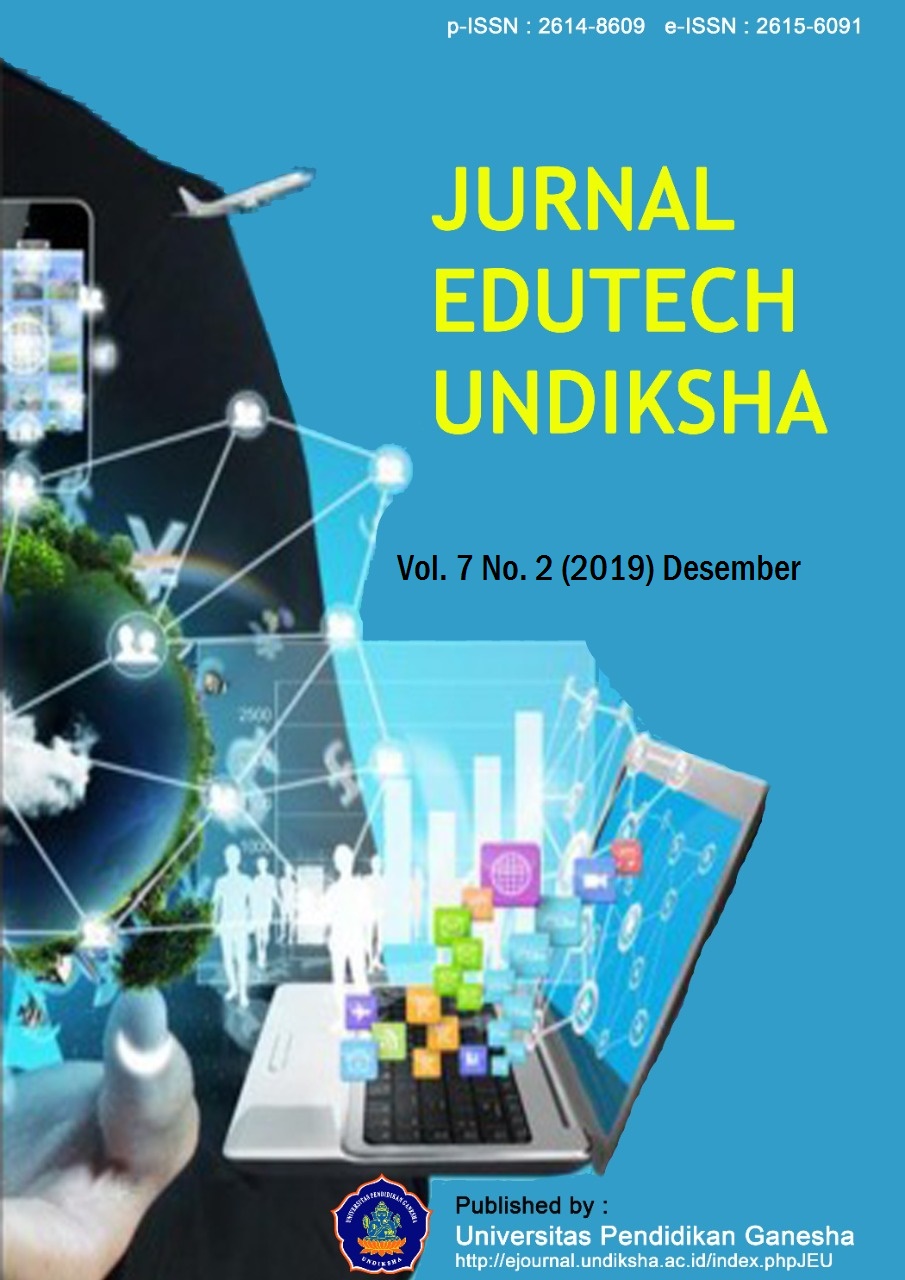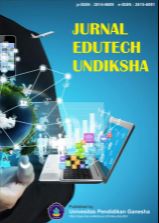PENGEMBANGAN BLENDED LEARNING BERBASIS COGNITIVE LOAD THEORY DENGAN SETTING LESSON STUDY PADA MATA PELAJARAN GEOGRAFI DI MA SYAMSUL HUDA
DOI:
https://doi.org/10.23887/jeu.v7i2.23160Abstract
Permasalahan yang ditemukan di MA Syamsul Huda yaitu rendahnya hasil belajar Geografi kelas xi. Hal ini disebabkan karena penyampaian materi dilakukan secara konvensional, keterbatasan jam pelajaran dan siswa banyak di tuntut untuk menghafal sehingga terjadi kelebihan kognitif (overload theory). Penelitian ini memiliki tiga tujuan, Tujuan penelitian untuk: (1) mendeskripsikan rancang bangun pengemabangan blended Learning berbasis cognitive load theory dengan setting lesson study (2) mengetahui kualitas hasil pengembangan blended Learning berbasis cognitive load theory dengan setting lesson study menurut review para ahli dan uji coba produk, serta (3) mengetahui efektivitas blended Learning berbasis cognitive load theory dengan setting lesson study yang dikembangkan. Penelitian ini adalah penelitian pengembangan dengan Model pengembangan yang digunakan adalah model ADDIE. Metode pengumpulan data yang digunakan adalah metode pencatatan dokumen, kuesioner dan tes. Teknik analisis data yang digunakan yaitu teknik deskriptif kualitatif, analisis deskriptif kuantitatif, dan analisis statistik inferensial. Hasil penelitian yaitu: (1) Rancang bangun blended Learning berbasis cognitive load theory dengan setting lesson study dikembangkan dengan model ADDIE. (2) Blended learning yang dikembangkan memiliki kualitas dengan: (a) hasil review ahli isi berpredikat sangat baik (92,00%), (b) hasil review ahli desain pembelajaran menunjukkan blended learning berpredikat sangat baik (91,89%), (d) hasil uji coba perorangan, uji coba kelompok kecil dan uji coba lapangan menunjukkan blended learning berpredikat sangat baik (91,91%), (92,81%) dan (91,89%). (3) Efektivitas pengembangan menunjukkan bahwa blended learning yang dikembangkan efektif meningkatkan hasil belajar geografi (thitung= 8,39 > ttabel = 2,000 pada taraf signifikan 5%)
Kata-kata kunci: Blended Learnin, Lesson Study, Pengembangan
Problems found in MA Syamsul Huda is the low learning outcomes geography class xi. This is because the delivery of the material is done conventionally, limited hours and many students are required to memorize so that there is a cognitive overload (overload theory). This research aimed to: 1) Describing the design of blended learning based on cognitive load theory with setting lesson study 2) describe the quality of the results of the validation of the development of blended learning based on cognitive load theory with setting lesson study are developed according to the review experts and product trials in geography subjects and 3) Knowing the effectiveness of the development result. Development model used was ADDIE. The data collected in this research is quantitative and qualitative data. Data was collected using the method of recording documents, questionnaires and tests. The results of this research are as follows. (1) The design of blended learning based on cognitive load theory subjects with the ADDIE model includes five phases. (2) blended learning based on cognitive load theory biology subjects developed valid with: (a) the results of expert review the contents of the subjects showed predicated blended learning based on cognitive load theory is very good (92,00%), ((b) the results of expert review of instructional design blended learning predicated showed very good (91,89%), (d) the results of individualtrials, small group trial and field trials demonstrate blended learning based on cognitive load theory is predicated very good (91,91%), (92.81%) and (91,89%). (3) The effectiveness development shows that blended learning based on cognitive load theory developed can effectively improve the learning results of science (tcount = 8,39 > ttable = 2,000, significance level 5%).
Keywords: Blended Learning, development, Lesson Study
Downloads
Published
How to Cite
Issue
Section
License
Authors who publish with the Jurnal EDUTECH Undiksha agree to the following terms:
- Authors retain copyright and grant the journal the right of first publication with the work simultaneously licensed under a Creative Commons Attribution License (CC BY-SA 4.0) that allows others to share the work with an acknowledgment of the work's authorship and initial publication in this journal.
- Authors are able to enter into separate, additional contractual arrangements for the non-exclusive distribution of the journal's published version of the work (e.g., post it to an institutional repository or publish it in a book), with an acknowledgment of its initial publication in this journal.
- Authors are permitted and encouraged to post their work online (e.g., in institutional repositories or on their website) prior to and during the submission process, as it can lead to productive exchanges, as well as earlier and greater citation of published work. (See The Effect of Open Access)














